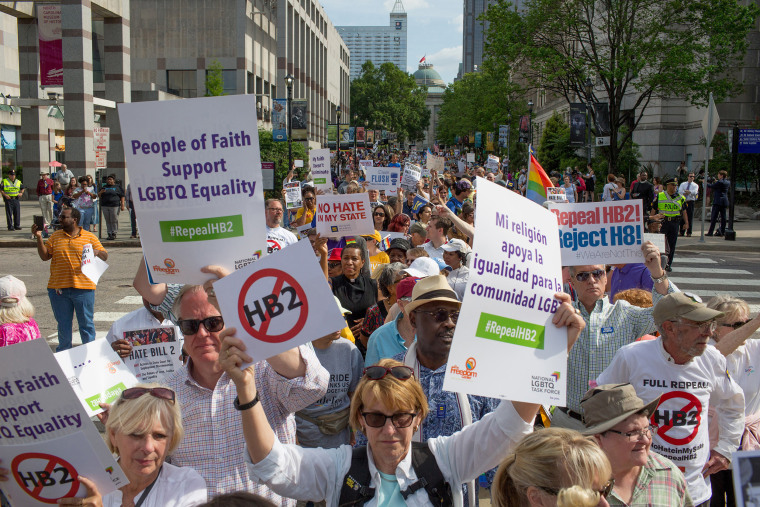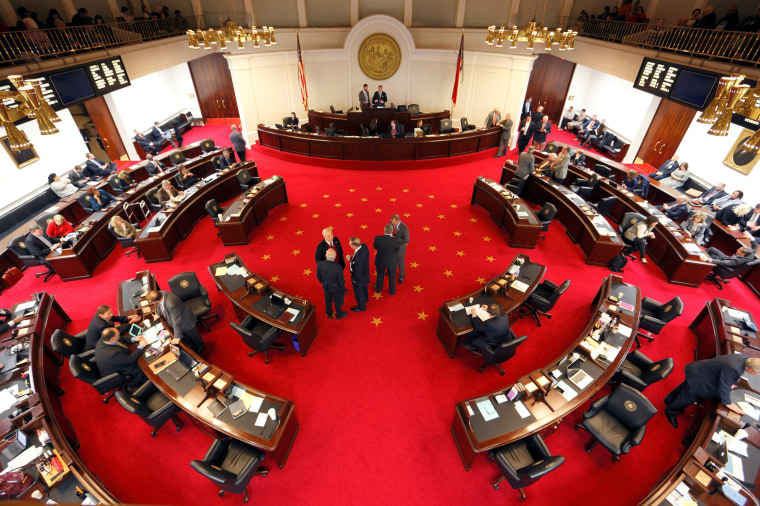N. Carolina Cities Begin Passing Historic LGBTQ Nondiscrimination Laws
Three North Carolina municipalities passed discrimination protections for LGBTQ people this past week, shortly after the expiration of a yearslong moratorium on such measures.
Hillsborough, Carrboro and Chapel Hill passed ordinances protecting lesbian, gay, bisexual, transgender and queer people from discrimination in public accommodations and employment on Monday, Tuesday and Wednesday, respectively.
They’re the first measures of their kind passed since the 2017 repeal of North Carolina’s infamous HB2 “bathroom bill.” That controversial legislation, which passed in 2016 and restricted which public facilities transgender people could use, spawned national outrage and boycotts that were expected to cost the state billions in lost business. The repeal of HB2, however, was part of a “compromise bill” that placed a statewide moratorium on municipalities passing nondiscrimination ordinances. That bill, HB142, expired on Dec. 1, and advocates were ready and waiting.

The three bills that passed so far are similar, though the Carrboro and Hillsborough ordinances carry a $500 penalty for violation and, according to their text, “Each and every day during which such discrimination continues shall be deemed a separate offense.” Officials in Orange County and the city of Durham are expected to vote on nondiscrimination measures Tuesday, and the Greensboro City Council is expected to discuss a similar ordinance in the coming weeks.
Advocates say it’s been a long time coming.
“We’ve been talking with elected officials since well before HB2 and trying to get these kinds of progressive policies passed,” Allison Scott, director of policy and programs at the Campaign for Southern Equality, told NBC News. “So to see these actually coming up to a vote feels amazing.”
People who live in the municipalities that pass these ordinances will not only be protected on the local level from discrimination based on sexual orientation and gender identity — but also based on race, national origin, marital or familial status, pregnancy, veteran status, religious belief, age and disability. That’s because North Carolina is one of five states that only have statewide discrimination protections for people with disabilities, leaving LGBTQ people and other groups open to discrimination in areas where they aren’t currently protected by federal law.
Even in areas where LGBTQ individuals are protected by federal law, there may be loopholes that leave some people out. Scott cited the Supreme Court’s decision in Bostock v. Clayton County, Georgia, as an example: The landmark 2020 decision ruled that LGBTQ people are protected under federal civil rights law from employment discrimination, but this doesn’t include individuals who work at small businesses with fewer than 15 employees. Those individuals, however, will now be protected from discrimination under these new local ordinances.
“It just shows the importance of why these laws are needed and why cities and counties need to step up,” Scott said.
HB2’s lasting impact
In early 2016, the Charlotte City Council passed North Carolina’s first public accommodations law protecting LGBTQ people from discrimination. The ordinance, however, drew criticism due to a clause that said transgender people would be allowed to use the bathroom that aligns with their gender identity rather than their sex assigned at birth.
Shortly after, the North Carolina General Assembly called a special session to debate the ordinance. Lee Storrow, executive director of the North Carolina AIDS Action Network, said the ordeal was disheartening to many LGBTQ people in the state.

“That whole debate was just really hard to be a part of,” said Storrow, who has lived in Chapel Hill since 2007. “Because of the debate in 2016, people are so aware that they’re not protected, and it may not be that they have a specific moment where they’ve directly been discriminated against, but just the threat and knowing that they have no legal protections, that really has an impact on folks.”
In March 2016, just a few weeks after Charlotte passed its nondiscrimination ordinance, then-Gov. Pat McCrory, a Republican, signed into law HB2, or the Public Facilities Privacy and Security Act.
When the General Assembly did finally repeal HB2 the following year, municipalities still weren’t allowed to pass their own nondiscrimination measures. While advocates have waited for the moratorium to expire, LGBTQ North Carolinians have continued to face discrimination, they say.
“Just this month, someone in our network reached out about a person who was denied gender-affirming care who works for the state,” Kendra Johnson, executive director of Equality North Carolina, said.
The statewide LGBTQ advocacy group also received calls during the election about people being “policed around their identity, because their name does not match what the particular poll worker thought they should look like if they had a certain gender marker on their ID,” according to Johnson.
“It’s every single month we hear cases of discrimination,” Johnson added. “I know that these measures are necessary because we don’t have comprehensive nondiscrimination in the state, and we do not have it on the federal level, so we have to start where people live and work, and that’s cities and towns.”
The end of the moratorium means municipalities can start passing their own nondiscrimination ordinances, but there are limits. Scott said there’s a clause in HB142 that gives only the General Assemblythe power to legislate bathrooms and public changing facilities.
“That’s why we still need a full repeal of 142,” she said. “We know fully 67 percent of North Carolinians, a supermajority, believe that LGBTQ people should be protected from discrimination.”
‘A sense of relief’
After Carrboro passed its ordinance Tuesday, Mayor Lydia Lavelle said it reminded her of how she felt when same-sex marriage became legal.
“It’s kind of like, ‘About time,’” she said. “I’m feeling like it was long overdue.”
North Carolina will join 47 other states that either have statewide protections for LGBTQ people or allow cities and counties to create their own protections, according to Lavelle, who is a law professor at North Carolina Central University.
“We were an outlier before,” she said. “We’re joining the strong, strong majority of states that allow communities to do this.”
Tiz Giordano, who works in Carrboro, said they’re “elated” that the town passed discrimination protections for LGBTQ people.
“I’ve been able to build queer community, have chosen family and live in safety as my true self due to living in Carrboro and working in an affirming workplace,” they said. “I just want other queer and trans people to be able to feel this way and feel protected, especially in medical settings.”
Though Carrboro is a relatively progressive community, Giordano said their spouse has faced medical discrimination in the past. Under the new ordinance, hospitals and physicians’ offices will be considered public accommodations and LGBTQ people will be protected.
“Knowing that people will be able to have a case in court if they are being discriminated against definitely gives me a sense of relief,” Giordano said.
Related
Trump stacked courts with judges ‘hostile’ toward gays, report says
Vanity Reid Deterville, program director of the LGBTQ Center of Durham, said nondiscrimination laws at any level of government are especially important after the Trump administration rolled back certain federal protections for LGBTQ people over the last four years.
“Protections of any sort when it comes to the LGBT community — and, more specifically, queer and trans Black women, people of color — is critical,” she said, pointing to their level of marginalization in society.
Johnson said she’s confident the newly passed ordinances will help better protect LGBTQ people in the state, but she said she’s also happy to see elected officials coming together to do something for their constituents.
“I think we’re in a moment where there’s been a real ‘us versus them’ mentality coming from the White House down,” she said. “It’s nice to see elected officials recognizing that yes, there is discrimination, people should have the right to pursue their livelihood, to have housing, to not be discriminated [against] in health care and to be treated as equal and valuable citizens of towns, and acting to actually start to make that a reality.”